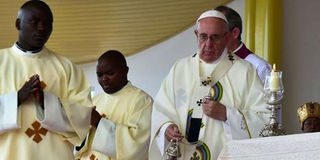Confession, penance will help us address past injustices better

Pope Francis leads an open-air mass at the University of Nairobi on November 26, 2015. This week, conversations tended to focus on his leadership style, the messages that he gave to Kenyans, and the teachings of the Catholic Church. PHOTO | GIUSEPPE CACACE | AFP
What you need to know:
- However, there was relatively little discussion of the importance of confession and penance, which — at least for me — lie at the heart of Catholicism.
- In Kenya, confession of past wrongs was supposed to take place as part of the Truth, Justice and Reconciliation Commission, which sat from 2009 to 2013.
- At a global level, people also tend to be reluctant to admit wrongdoing lest they face judicial or popular sanction.
This week’s visit by Pope Francis, — a man known for his humility — prompted much debate.
Conversations tended to focus on his leadership style, the messages that he gave to Kenyans, and the teachings of the Catholic Church.
However, there was relatively little discussion of the importance of confession and penance, which — at least for me — lie at the heart of Catholicism.
Significantly, confession is also a common theme in restorative justice, which President Kenyatta has often spoken of, for example, in his State of the Nation address last March.
Restorative justice focuses on the needs of victims and perpetrators, and has been defined by Professor Menkel-Meadow as an effort to “repair, restore, reconcile, and reintegrate the offenders and victims to each other and to their shared community”.
For many, confession, or an acknowledgement of wrongdoing, can make a significant contribution to restorative justice – especially if it goes hand in hand with apologies, reparations, and forgiveness – by helping to restore the humanity of perpetrators, and by easing the suffering of victims.
In Kenya, confession of past wrongs was supposed to take place as part of the Truth, Justice and Reconciliation Commission, which sat from 2009 to 2013.
This commission was partly inspired by the South African Truth and Reconciliation Commission, which saw amnesty applicants speak in public about the injustices and abuses they had committed.
Far from perfect, this process nevertheless helped cultivate a public consciousness of apartheid as an unjust system, and to limit the number of lies that could be told about the past.
To give just one example: During the questioning of Jeffrey Benzien, the former police officer re-enacted the ‘wet-bag’ torture technique.
This image — of a large man sitting on the back of a black man and pulling a bag over his head and then tightening it — provided a visually potent example of gross human rights violations by security personnel; evidence that was particularly difficult to refute given that it was provided by a self-confessed perpetrator.
POPULAR SANCTION
Kenya’s truth team offered no similar moments.
Instead, months of adversely mentioned persons hearings revealed little that was new and not a single admission of personal responsibility or guilt.
Instead, most of these people insisted that they could not remember; they had not been there; the issue in question was the responsibility of someone further up or down the pecking order; the allegations levied were false and a product of poor investigations, groundless rumours, or malicious intent; or that the action in question was legal and entirely justified.
This is not uncommon. Indeed, public confession is rare around the world, especially by political elite.
For the Kenyan truth and justice team, this confessional lacuna was partly due to the fact that it never opened amnesty applications — even though the law allowed for amnesty to be recommended for non-gross human rights violations – because commissioners concluded that few people would apply.
Those adversely mentioned also faced no imminent threat of prosecution.
At a global level, people also tend to be reluctant to admit wrongdoing lest they face judicial or popular sanction.
However, people seem to be particularly reluctant in Kenya for a number of reasons.
First, people often do not seem to think that what they have done is wrong.
Corruption, for example, is sometimes presented as a necessary means of accumulation to fund political campaigns, initiate development projects, and redistribute resources.
MORAL PANIC
Extra-judicial killings are similarly presented as a normal part of policing in a context of limited investigatory capacities and judicial corruption where certain types of ‘youth’ are considered probable or potential criminals.
Second, elites often enjoy the protection of their peers and communities – who, for example, if someone is accused of corruption, may claim that they were made a scapegoat.
Finally, many fear the possibility of being labelled as a traitor if, by confessing, they incriminate others.
However, this failure to admit wrongdoing – especially if one is committed to restorative justice – is a significant problem, as it ensures that many facts remain unknown, and that there is no proper acknowledgement.
As a result, I would like to add the importance of admissions of guilt to the list of topics for discussion following the visit by Pope Francis.





